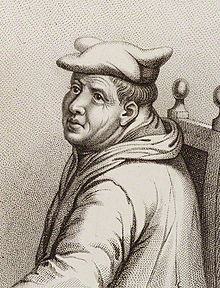Edmund Bonner
|
The Right Reverend Edmund Bonner |
|
|---|---|
| Bishop of London | |
 |
|
| Church | Roman Catholic |
| Diocese | Diocese of London |
| Elected | 1539; 1553 |
| Term ended | 1549; 1559 (twice deprived) |
| Predecessor | John Stokesley; Nicholas Ridley |
| Successor | Nicholas Ridley; Edmund Grindal |
| Other posts |
Bishop of Hereford elected 27 November 1538 |
| Orders | |
| Ordination | c. 1519 |
| Consecration | 4 April 1540 |
| Personal details | |
| Born | 1500 Hanley, Worcestershire |
| Died | 5 September 1569 The Marshalsea |
| Buried | Southwark, London (initially) |
| Nationality | English |
| Denomination | Roman Catholic |
| Parents | Edmund Bonner & Elizabeth Frodsham |
| Alma mater | Broadgates Hall, Oxford |
Edmund Bonner (also Boner; c. 1500 – 5 September 1569), Bishop of London, was an English bishop. Initially an instrumental figure in the schism of Henry VIII from Rome, he was antagonized by the Protestant reforms introduced by Somerset and reconciled himself to Roman Catholicism. He became notorious as "Bloody Bonner" for his role in the persecution of heretics under the Catholic government of Mary I of England, and ended his life as a prisoner under Queen Elizabeth.
He was the son of Elizabeth Frodsham, who was married to Edmund Bonner, a sawyer of Hanley in Worcestershire. John Strype (Eccles. Mem. III. i.17 2-173) printed an account, with many circumstantial details, stating that Bonner was the natural son of George Savage, rector of Davenham, Cheshire, and that his mother married Bonner only after the future bishop's birth. This account was disputed by Strype's contemporary, Sir Edmund Lechmere, who asserted (ib. Annals, I.ii.300) that Bonner was of legitimate birth.
He was educated at Broadgates Hall, now Pembroke College, Oxford, graduating bachelor of civil and canon law in June 1519. He was ordained about the same time and admitted doctor of civil law (DCL) in 1525.
In 1529 he was Cardinal Thomas Wolsey's chaplain, which brought him to the notice of the king and Thomas Cromwell. After the fall of Wolsey he remained faithful to him and was with him at the time of his arrest at Cawood and death at Leicester in 1530. Subsequently he was transferred, perhaps through Cromwell's influence, to the service of the king, and in January 1532 he was sent to Rome as the king's agent when the question of the king's divorce was raised. There he sought to obstruct the judicial proceedings against Henry in the papal curia. In October 1533 he was entrusted with the task of suggesting to Clement VII (while he was the guest of Francis I at Marseille) Henry's appeal from the pope to a general council; but there seems to be no good authority for Gilbert Burnet's story that Clement threatened to have him burnt alive. For these and other services Bonner had been rewarded by successive grants of the livings of Cherry Burton (Yorks), Ripple (Worcester), Blaydon (Durham), and East Dereham (Norfolk), and in 1535 he was made Archdeacon of Leicester.
...
Wikipedia
